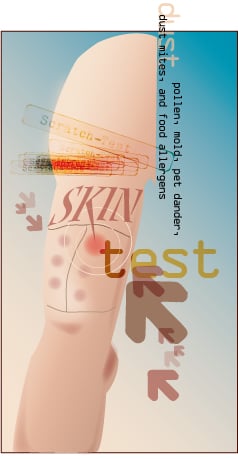Allergist Interview: Dr. Donald Dennis
 Dr. Donald Dennis is an experienced otolaryngologist with particular experience treating mold allergies. He has a lot of interesting and helpful things to say, so let’s get right to the interview:
Dr. Donald Dennis is an experienced otolaryngologist with particular experience treating mold allergies. He has a lot of interesting and helpful things to say, so let’s get right to the interview:
Please tell me a little bit about yourself and your history as an allergist.
“I went to the Medical College of Georgia and then did an internship at Emory, followed by a five-year residency in ENT head and neck surgery at Johns Hopkins in Baltimore. I came back to Atlanta in 1980 and have been involved in head and neck surgery since.”
“I became interested in this field when I was in medical school. I had a clerkship in ENT surgery with Dr. Edward Porubsky, and subsequently applied for residency in the field. I appreciated the fact that ENT surgery was so diversified, touching on allergy issues, vocal cord surgery, inner ear surgery with cochlear implants, reconstructive surgery, cancer treatment, trauma surgery, and more. I knew I’d never be bored.”
Is there a particular type of allergy or treatment your practice specializes in?
“Eighty percent of what we see ENT is allergy-based. For instance, most ear infections are because of allergies. Fungal allergies in particular are among the more destructive of allergies because the reaction to them is delayed. The approaches that internal medicine doctors and ENT doctors take to treating allergies is completely different; for instance, they don’t get to look in the tissues like ENT practitioners do.”

“In addition, the standard method of allergy testing is skin testing. There’s nothing wrong with this, but many internal medicine doctors don’t believe blood testing is accurate. I believe it is, however. Skin tests miss all the delayed allergies, but blood tests pick them up. A lot of doctors don’t believe that IgG allergies have much significance, but IgG is involved in delayed allergies and food sensitivities, as well as acid reflux, which can cause sinus and ear problems.””Nasal congestion, headaches, fatigue, and weight gain may all be food allergy symptoms. Celiac disease can only be confirmed when a biopsy is done, at which point the gluten sensitivity is really far gone. In addition, it’s possible that a gluten sensitivity doesn’t attack the gut but makes eyes swell, or causes congestion, among other symptoms; the end organ in some people is different. Crossover with soy and dairy allergies is also very common with gluten sensitivity.”
“The ALCAT blood test screens for sensitivities to 20 major food groups, measuring IgG antibody levels to food in the blood and catching delayed reaction allergies. By measuring white cell swelling before antibodies even form, the ALCAT tells us about a patient’s inflammatory reactions, which are not as acute or serious as other allergies, but nevertheless let us know about a patient’s overall health and allergic makeup.”
What do you love about your job?
“Getting people well. The happiness that is there when restoring someone’s health and helping them have a normal life again. Finding out what’s wrong with them. There’s also another group – of people that have been in toxic mold, which can cause serious neurologic and immune damage. This can precipitate blindness, paralysis, and more. When these patients get out of that toxic environment and are detoxed, many who are in wheelchairs can walk again. Seeing this is extremely rewarding.”
If you could suggest one thing for your patients what would it be?
“Try to educate yourself. Read the material that you’re given. Follow instructions.”
What is your favorite allergy relief product?
“Salt water nose washes. They remove allergens quickly and stop reactions faster than a pill can. Saline is a natural nasal decongestant. Allergens come in through the nose, and when they’re removed, the problem stops. Not that there’s not a place for medication, but nasal irrigation with salt water is the easiest thing and it’s natural.”
Where do you see allergy treatment going in the future?
“I think there might be ways to give antigens that result in a more permanent desensitization in the T-cells. DNA vaccines might also be a possibility.”
Is there anything else you’d like to add or discuss?
“A 1999 Mayo Clinic study found that 93 percent of patients with chronic sinusitis were experiencing an immune reaction to fungus or mold.”
“We’ve been trying to create a system for treating chronic sinusitis that the average person can do for themselves without a prescription. Microbalance Health Products fill this need by balancing the microflora of both the nose and the environmental air to combat the role of mold in sinusitis. Along with nasal sprays and irrigation and steamers, nutritional products that boost the immune system are also important.”
“Micro Balance Health Products offer environmental control for both the body and the air and include versatile Citri Drops, which individuals can drink with water or juice or put in nasal sprays or facial steamers.”
“In addition, Micro Balance Health Products includes three basic air products to treat environmental mold: an organic, non-toxic, odorless spray to mist the affected area; an air wick to put on top of a HEPA air purifier or vent fan; and an organic, soy-based candle with citrus oils. These products, composed of a mixture of oil from citrus seeds, break down the cell walls of mold, killing the spores and making them powerless to cause reactions.”
Mold is a huge health issue for everyone, but those with allergies are especially susceptible to its effects. By addressing the environmental factors that contribute to fungal infections, Dr. Dennis helps prevent and treat sinus trouble at the source.
